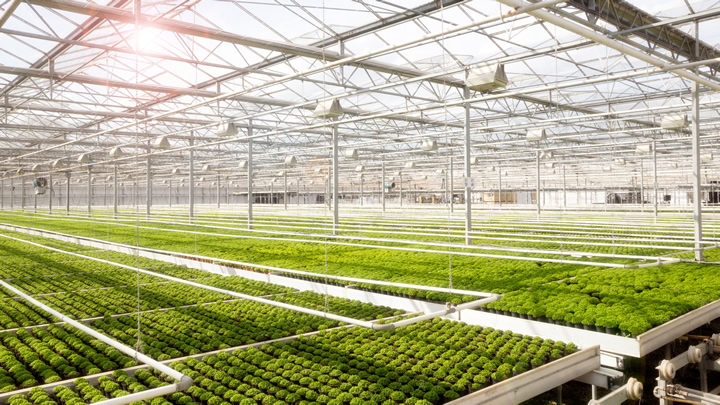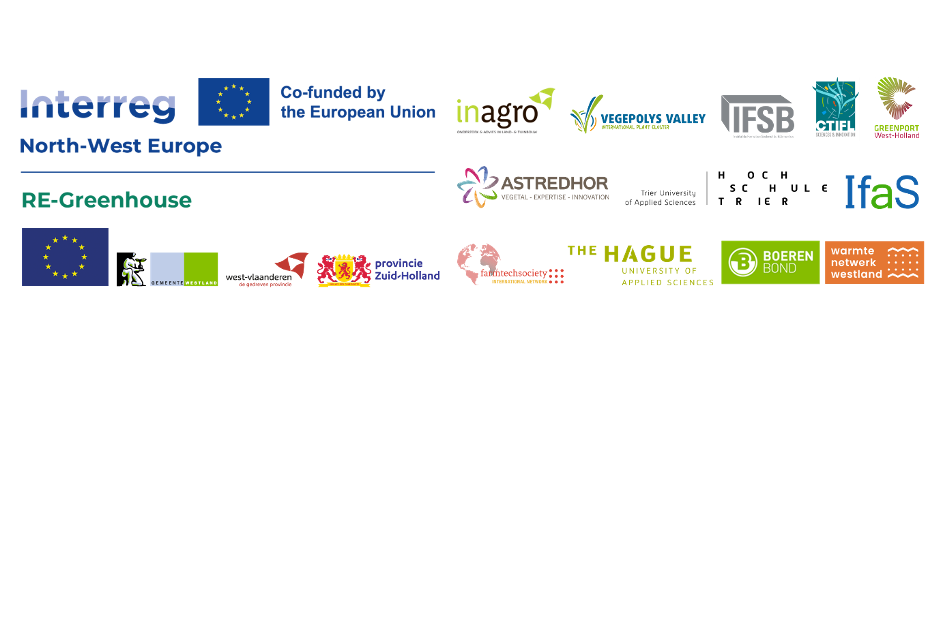RE-Greenhouse
Accelerating the transition to renewable energy for greenhouse horticulture in Europe.
Centre of Expertise Mission Zero

Northwest Europe has a high density of greenhouses for the cultivation of vegetables, flowers, and fruit. The sector relies largely on fossil fuels as its main energy source, which constitute the second-largest production costs. RE-Greenhouse, an Interreg North-West Europe project, aims to accelerate the transition to renewable energy in the greenhouse horticulture sector for climate resilience, food security, and increased competitiveness.
The project partners of RE-Greenhouse address this together through knowledge exchange and various international actions. Within RE-Greenhouse, eleven partners from five countries in Northwest Europe (Belgium, France, Germany, Luxembourg, the Netherlands) collaborate.
“Considerable potential for renewable energy in this sector goes unrealized because of insufficient expertise in promising technologies and a shortage of time, resources, and knowledge among numerous greenhouse growers to make well-informed decisions.”
Approach
Key project initiatives:
Pilot Setups
The project establishes pilot locations in four countries: Belgium, France, Luxembourg, and the Netherlands. In these countries six renewable energy technologies are implemented: solar energy, heat networks, waste heat, biomass, wood heating systems, and biogas. These pilots serve as the basis for developing a comprehensive decision-making tool.
Transnational Measurement Plan and Transfer System
A transnational metric plan and transfer system for operational greenhouse gas data is implemented to provide insight into the energy flow, consumption, production, and storage of renewable energy sources.
Demonstration Visits
The project organizes on-site visits to the pilot setups with the aim of informing, inspiring, and encouraging growers and stakeholders, thus promoting the transition to renewable energy sources.
Decision-making Tool
A decision-making tool will determine the most suitable and opportune renewable energy sources based on technical and economic factors. Its widespread adoption is planned in Belgium, Germany, France, Luxembourg, and the Netherlands through an international open call for growers and targeted stakeholder training.
Long-Term Impact
Through transitioning to renewable energy sources, growers enhance their resilience against geopolitical shocks. In addition, they are facilitating a systemic shift towards sustainable and environmentally friendly regional practices. This shift contributes to food security, regional employment, and increased competitiveness in the global market for sustainable agricultural products.
Duration
January 1, 2024 – December 31, 2027
Funding
Interreg North-West Europe, Municipality of Westland.
The RE-Greenhouse project, is coordinated by Inagro and supported by a grant of €2.3 million from the Interreg North-West Europe program. The project aims to accelerate the transition from fossil fuels to sustainable energy production in NWE greenhouses. The consortium consists of 11 partners from Belgium, France, Luxembourg, and the Netherlands.
Results
Greenhouse RES (renewable energy sources) decision-making tool (see approach for more information).
Collaboration
Inagro (BE), VEGEPOLYS VALLEY (FR), IFSB - Construction Sector Training Institute (LU), Greenport West-Holland (NL), Innovation Support Centre for Agricultural and Rural Development (BE), Interprofessional Technical Centre for Fruit and Vegetables (FR), Trier University of applied Sciences (DE), ASTREDHOR – Institute of plant professionals (FR), FarmTech Society (BE), Heat Grid Westland (NL)
Team
Pauline de Jong
Sander Mertens, Chair of Energy in Transition
Baldiri Salcedo Rahola
Marianne Blommers (student)
Contact
Pauline de Jong, [email protected], 06-28837066.
